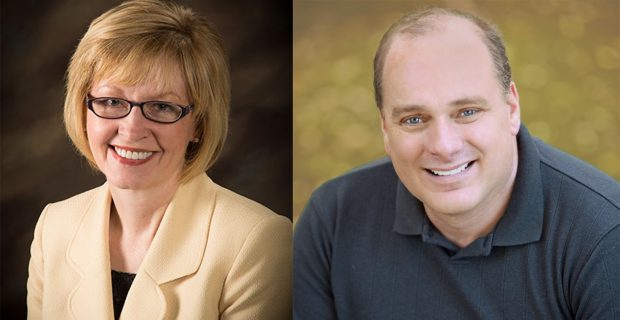In a highly unusual move, Bonneville County Prosecutor Randy Neal on Monday issued a point-by-point rebuttal to Idaho Falls Superintendent Karla LaOrange’s critiques of his office — which she shared in an interview with EdNews last month.
The back-and-forth centers around a lawsuit: Neal charged former Idaho Falls Superintendent Jim Shank and district spokesperson Margaret Wimborne for inappropriately using public funds to promote a 2022 bond issue that ultimately failed.
Neal said he felt obligated to pursue the charges after the sheriff’s department referred the case to him, and after evidence showed “undeniable” guilt.
Neal fined the two district employees a combined $375, but the case ballooned when — instead of paying the fine on behalf of their employees — Idaho Falls trustees hired a lawyer (at a cost of tens of thousands of dollars) to fight the charge.
Since July, $60K spent on attorneys:
EdNews asked LaOrange and Wimborne in late September how much their attorneys had been paid so far to fight Neal’s charges/the tax commission. Both said they would provide the information, but had not done so as of Oct. 17.
An EdNews investigation shows that the Idaho Falls School District spent $63,016 on legal fees in fiscal year 2022-23. In July, August, and September (FY 23-24), the district has spent another $60K, approximately, on attorneys. The vast majority has gone to the law firm Hawley Troxell.
Now, both the district and prosecutors’ office are involved in extended litigation at taxpayers’ expense.
LaOrange said the district is fighting the charges against Shank and Wimborne because they “did nothing wrong so they should not have to pay a fine, no matter the amount.”
Plus, the charges carry a cost that’s more than financial.
“The claims the district violated the state’s election laws damage the district’s reputation,” LaOrange wrote in a statement to EdNews. “They erode trust with parents and patrons, and that trust is critical to the work we do.”
Neal said he “didn’t pick this fight” — and doesn’t want to be part of it.
“I think the public perception is that this is a squabble between me and the school board,” Neal said. “I don’t want the public impression to be that the prosecuting attorney of Bonneville County has declared war on the district.”
And Neal said some people think he’s charged school district employees to appease his political base, which he said is not the case.
“That would be absolutely dumb,” he said. “These guys got 70% approval (at the last school election) so if I’m picking the 30% side I’m not very politically astute.”
Neal is especially worried about public perception of him as the school district’s antagonist because there’s another legal matter that pits him against Idaho Falls school leaders: the Idaho State Tax Commission found that Idaho Falls’ $33 million plant facilities levy was not valid — a finding trustees decided to fight in court.

If a judge upholds the commission’s finding, it would fall to Neal to enforce.
In both cases, Neal said he’s acting out of obligation, and compared himself to an umpire tasked with objectively calling balls and strikes.
Plus, failing to charge the district employees just because doing so would be unpopular would amount to “political cowardice,” Neal said.
He plans to hold a town hall forum Tuesday night to address community concerns about the matter.

For a breakdown of Neal’s responses to LaOrange, and district comments and updates on the $33 million levy that’s in question, read on below.
Neal: “Any suggestion that I have ‘chosen sides’ is simply untrue”
In a statement issued Monday, Neal wrote out detailed, bullet-point responses to four critiques from LaOrange.
Below are LaOrange’s critiques, followed by Neal’s responses (edited for length and clarity; a full version of his rebuttals can be found here).
LaOrange’s Critique: “The concern (over inappropriate use of tax dollars) should have been brought to the district’s attention promptly, so it could have been addressed at the time, not months after the fact.”
Neal’s Response:
- Neal said taxpayers did raise concerns with the district prior to the election, and that it’s not his office’s job to provide legal advice to those who may be breaking the law.
- The district “had undeniably not followed the advice of their legal counsel” regarding “the limitations on the District’s ability to use district funds to advocate for bond issues.”
- Two district attorneys asked Neal to delay the charges until after the May election, which Neal agreed to do “because we do not seek to influence such elections in any way.” The delay in making the charges was done as a courtesy.
LaOrange’s Critique: “It’s inappropriate to “file misdemeanor charges against individual district employees who are working on behalf of our students and patrons.”
Neal’s Response:
- Wimborne and Shank’s alleged violation of the public integrity in elections act is a civil penalty, not a crime. “The employees were not charged with a crime. They were not arraigned, they did not enter a plea of guilty or not guilty and it does not appear on any record of their criminal history.”
- Working “on behalf of students and patrons” does not provide immunity to those who violate the act.
- Neal writes that while he has “absolute discretion” over whether to pursue legal actions against individuals, that discretion must “be exercised in the interest of justice, and without fear or favor.” “To avoid enforcement of the law simply because it would be politically unpopular is the definition of political cowardice.”
LaOrange’s Critique: “The prosecutor’s office should not be spending so much time, money and resources on this case.”
Neal’s Response:
- Neal agreed, but said his office is “being forced to litigate this enforcement action” because Idaho Falls trustees hired attorneys to defend Shank and Wimborne, as well as to challenge the Idaho State Tax Commission’s determination that the levy was illegal.
- His office would rather be “prosecuting criminals, providing legal advice to Bonneville County and fulfilling our other constitutional and statutory duties.”
- His office has not asked for “any additional allocation of public money to litigate this matter,” while he said trustees “specifically authorized the expenditure of public money to hire outside attorneys to litigate this action.”
LaOrange’s Critique: “LaOrange said the prosecutor’s office has “blatantly ignored Sunshine Act violations by groups who have opposed the bond,” even though the issue has been brought to their attention.”
Neal’s Response:
- “This statement is simply untrue.”
- Neal said he only considers initiating cases “based on the results of law enforcement investigations,” not “based on emails from opposing parties or their counsel.”
- “Our office has never ‘blatantly ignored’ Sunshine Act violations brought to our attention. We have initiated action against violators of the Sunshine Act.”
- To his knowledge, all complaints have been investigated and either law enforcement or prosecutors “have determined that prosecution would not be warranted or supported by adequate evidence.”
- “Finally, it does not matter whether others are violating the law. This is the common ‘but other drivers are speeding too!’ defense. Two wrongs do not make a right, and certainly in no way excuses actions which violate the law.”
Neal also defended his decision to charge Shank and Wimborne, and asserted his impartiality in the matter.
“Any suggestion that I have ‘chosen sides’ is simply untrue. In exercising these statutory duties my role, as coined by Chief Justice Roberts, is to objectively call “balls and strikes,” he wrote. “I have never personally taken a stand on these issues, and I have no personal stake in their outcome, as I do not live in their taxing district and I do not have any children in their school district.”
LaOrange: “…We were NOT speeding so why are we being ticketed”
According to Idaho statute, school districts can share factual information about bonds and levies, including “cost of indebtedness, intended purpose, condition of property to be addressed, date and location of election … or other applicable information necessary to provide transparency to electors.” LaOrange contends that that’s exactly what Idaho Falls school district did last fall, in preparation for the November 2022 election.
She said certain words from election materials have been highlighted as violations of election law, because they allegedly cross the line between information and advocacy. Those words include: “need,” “aged,” and “overcrowding.”
For example, these bookmarks that were distributed include the phrase “build new school to replace overcrowded IFHS,” as well as statements like: “Our students need modern, safe, and secure schools” and “We need to address growth and crowding in schools.”
This postcard includes phrases like: “aged Idaho Falls High School.”
This mailer includes statements like: “D91 needs to address growth and overcrowding and improve safety and security.”
“These materials are factual and provide very basic information,” LaOrange wrote. “We do not believe they violate the Public Integrity in Election Act and are not counter to the district’s legal counsel.”
LaOrange also implied that Neal is unfairly prosecuting the district’s employees: “if the prosecutor wants to protect elections, then we believe he should pursue ALL possible violations of the state’s election laws and pursue them with equal vigilance.”
And she took issue with Neal’s speeding analogy: “We are not arguing ‘others are speeding too!’ We are arguing that we were NOT speeding so why are we being ticketed for speeding when the folks who passed us on the highway aren’t getting stopped or ticketed.”
Ultimately, LaOrange said district officials are focused on resolving the issue as soon as possible.
An illegal levy? With bonds so difficult to pass, Idaho districts need an answer
On Monday, Neal’s statement wasn’t the only news churning about Idaho Falls. He also issued a press release with an update on Idaho Falls’ contested levy: An Ada County judge last week terminated a temporary injunction against the state tax commission.
That means the matter can proceed through the court system, where a judge will determine if the $33 million levy was legal.
LaOrange said the injunction lift is a “procedural matter.”
“D91 initiated the lawsuit because it was not clear the question would be resolved in time for tax bills to be correct if we waited for the tax commission to refer the case to the prosecuting attorney,” LaOrange wrote in a statement to EdNews. “We were right to do so, and he has done the right thing to let the court decide in the case we filed … It is now up to the Idaho courts to settle this matter.”
The levy is in question because the district already has another plant facilities levy in place, and the tax commission said only one is allowed — but Idaho Falls’ attorneys say otherwise.
Because both levies combined meet the requirements of a single levy — not to be on the books for more than 10 years, or to exceed .4% of the district’s total value — the new levy is valid, they argue.
“As it becomes increasingly difficult to pass school bonds in Idaho, school districts across the state need to be able to utilize all available tools allowed in Idaho statutes to raise the monies needed for facility upgrades and improvements,” LaOrange wrote. “The plant levy is one such tool so if there is confusion about how this levy can be used, then it is critical that a court rule on those questions.”
EdNews Data Analyst Randy Schrader contributed to this report.






